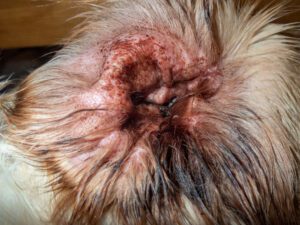Ear Mites in Dogs: How to Treat Ear Mites in Dogs
 Ear Mites in Dogs: Signs, Symptoms, and Treatments
Ear Mites in Dogs: Signs, Symptoms, and Treatments
If you’re a dog owner, you’re probably familiar with the term “ear mites.” These tiny parasites can cause discomfort and irritation for your furry friend. In this blog, we’ll look into what ear mites are, how to recognize them, and the best ways to treat and prevent them. Plus, we’ll address some common questions owners have about dog ear mites.
What Are Ear Mites in Dogs?
Ear mites, scientifically known as Otodectes cynotis, are tiny parasites that commonly infest the ears of dogs. These mites look like mini spiders, and thrive in warm, dark environments like your pet’s ear canal. While they primarily affect dogs, they can also infest other animals like cats, rabbits, and ferrets.
It takes around three weeks for a mite to grow from an egg to an adult, going through five stages during this time. Grown-up ear mites can stay alive for about two months, during which they continue to keep making more mites. The whole life cycle of ear mites typically happens while living on an animal’s body, but in some circumstances, they can survive for a short while in the surrounding environment.
 What Do Ear Mites Look Like?
What Do Ear Mites Look Like?
Although they’re too small to be seen with the naked eye, ear mites in dogs typically have a creamy-white color and a spider-like. Ear mites typically look like tiny white moving dots, and it is difficult to spot them on your own, usually requiring a vet with a microscope.
Symptoms of Ear Mites in Dogs
Wondering if your dog has ear mites? Keep an eye out for these common symptoms:
- Excessive scratching or rubbing of the ears
- Head shaking or tilting
- Redness and inflammation of the ear canal
- Dark, waxy discharge leaking form the ear, resembling coffee grounds
- Strong odor coming from the ears

If you notice any of these signs, it’s important to contact your AZPetVet veterinarian for a proper diagnosis and treatment plan. To diagnose, your veterinarian will look for the mite. This is usually easy and can be done by checking your pet’s ears with a special tool called an otoscope or by looking at ear discharge under a microscope. If the ears are painful, your pet might need to be relaxed with medication so they can be properly examined and treated.
If your dog has ear mites it is important to act quickly to ensure they receive proper treatment. When ear mites are left untreated, they can lead to bacterial infections, ear swelling, and in severe cases could eventually lead to partial or total deafness.
How to Prevent Ear Mites in Dogs
Prevention is key when it comes to ear mites. While it’s challenging to completely eliminate the risk of infestation, there are steps you can take to minimize the likelihood of your dog contracting these parasites:
- Keep your dog’s ears clean and dry, especially after baths or swimming
- Use a monthly preventive medication recommended by your veterinarian
- Avoid close contact with animals known to have ear mites
- Regularly inspect your dog’s ears for signs of irritation or infestation

If your dog has been around an infected animal, check them for symptoms. Even if your dog doesn’t show signs yet, ear mites are highly contagious, so it’s recommended to still treat them for ear mites. Disinfect their bedding, toys, and surfaces using pet safe cleaners and wash them in hot water to remove any mites.
Regularly clean your dog’s ears with a vet-approved cleaner to reduce the risk of an infestation. This also lets you check for early signs of mites.
Since we can’t always control what our dogs are around, there are topical treatments that can help prevent ear mites. These treatments can be applied once a month behind the shoulders and can not only prevent fleas and ticks but also keep ear mites at bay. Talk to your AZPetVet veterinarian about these products to keep your pup safe!
Are Ear Mites Contagious?
Yes, ear mites are highly contagious among animals. If one of your pets is diagnosed with ear mites, it’s crucial to treat all pets in the household to prevent the infestation from spreading. Since ear mites spread through close contact with other dogs, it is also important to avoid bringing your pet to dog parks and kennels until they are completely mite-free.
Though Ear mites are HIGHLY contagious to other dogs and animals, they are NOT contagious to humans, so you don’t need to worry about contracting ear mites from your furry friend.
Treatments for Ear Mites in Dogs
So, how do you get rid of ear mites in dogs? Treating ear mites requires a multi-faceted approach, including:
Prescription Ear Medications
Your veterinarian may prescribe ear drops or ointments containing parasiticides to kill the mites.
Topical Medications
In certain cases, your veterinarian may apply a topical medication to your dog’s skin between their shoulder blades.
Oral Medications
In severe cases, oral medications may be necessary to eradicate the infestation.
Cleaning Solutions
Regularly cleaning your dog’s ears with a veterinarian-approved ear cleaner can help remove debris and soothe irritation.
Environmental control
Thoroughly clean and disinfect your pet’s bedding and living areas to eliminate any mites and prevent reinfestation.
Your experienced AZPetVet veterinarian will tailor a treatment plan based on the severity of the infestation and your dog’s individual health status.
What Kills Ear Mites Naturally?
While some home remedies and natural treatments may offer temporary relief, they’re rarely effective at completely eradicating ear mites. It’s best to consult your veterinarian for safe and proven treatment options.
Schedule an Appointment Today with AZPetVet
Ear mites can be a nuisance for both dogs and their owners, but with prompt veterinary care and proper treatment, you can help your furry friend find relief and prevent future infestations. Remember, early detection and intervention are key to keeping your dog happy, healthy, and free from pesky parasites.
If you suspect your dog has ear mites or if you have any questions or concerns about your pet’s health, don’t hesitate to schedule an appointment with AZPetVet. Our team of experienced veterinarians is here to provide compassionate care and personalized treatment for your beloved companion. Schedule an appointment today and give your dog the relief they deserve!

